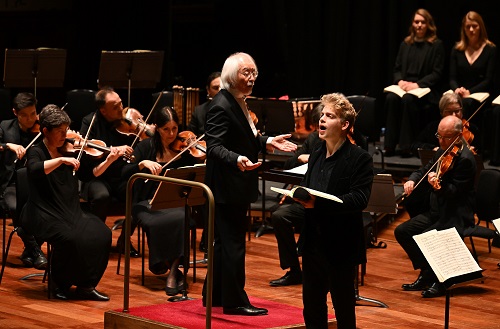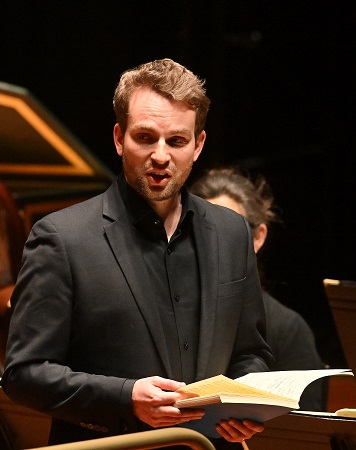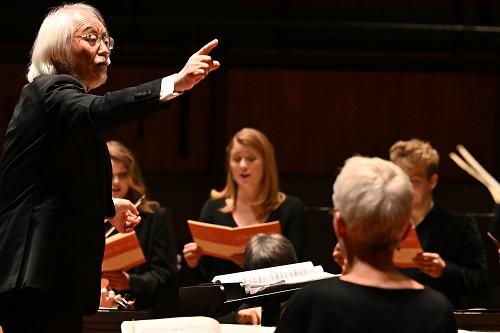Whether or not J.S. Bach’s seasonal work is an oratorio in the strict sense of the word is questionable, and for the purposes of a review, it is perhaps immaterial. This performance was so compelling it hardly matters. The work was written to be performed in Leipzig’s two principal churches across the two-week period between Christmas and Epiphany 1734-35 and comprises six cantatas outlining the birth, proclamation and adoration of Jesus (Parts 1-3), through to the feast of the Circumcision, the arrival of the Magi and King Herod (Parts 4-6). Because of its length – at least 130 minutes, with Masaaki Suzuki’s Bach Collegium Japan recording coming in at 2 hours and 22 minutes – we more often hear a live performance as a ‘sawn off’ version, often just three parts, and those usually appertaining to the Nativity. Performances at one sitting are relatively rare, as are those spread across two successive evenings, thereby making this event particularly welcome. That much of the material is recycled from other sources, or that the work in its entirety lacks dramatic unity is no barrier to our appreciation.

The inclusion of the motet Singet dem Herrn ein neues Lied (Saturday) and the ‘Sanctus’ from the Mass in B minor (Sunday) brought tangible excitement, if not adding anything related to the festive season. As a filler, both contributions helped create a respectable length for each evening and were sung with great panache. A good balance was achieved from the sixteen voices in the double-choir motet (unusually given with instrumental support rather than just continuo), and the ‘Sanctus’ provided a thrilling appetizer to Part 4 of the Oratorio, each offering demonstrating the choir’s prowess. But why the unnecessarily fast ‘Osanna in excelsis’? At one point the wheels nearly came off. Exhilaration is one thing, but a steeplechase is quite another. If detail was marginally compromised here, swinging rhythms earlier from the bass section were suitably bell-like, the whole rousing and celebratory.
And it was with a swing that the Oratorio began, albeit by a curiously reticent timpanist, but thereafter a memorable performance, as much for the outstanding soloists, each drawn from the choir, and the splendidly alert orchestra. Yet, without minimising the talent on stage, what left the deepest impression was the fascinating variety of instrumentation for each part and the wide range of expression within the arias. The individuality of Bach’s scoring is undoubtedly best appreciated when all six cantatas are performed together, distinctions visible here when oboes da caccia enriched the sonorities of the second and horns coloured the fourth. Flutes were conspicuous by their absence after Part Three, and trumpets and drums intermittently added their own pageantry in Parts 1, 3 and 6. Instrumental solos were an enlivening presence in several movements, not least from violin (Kati Debretzeni), flute (Lisa Beznosiuk) and oboe (Katharina Spreckelsen). With such changes of timbre, the ear and eye were constantly engaged.

Expressive and dramatic opportunities were both fully realised in the arias. ‘Schlafe mein Liebster’(Sleep my dearest) was mellifluously rendered by Hugh Cutting, and the atmospheric ‘Echo’ aria ‘Flößt, mein Heiland’ (Ah, my saviour) drew beguiling tones from soprano Jessica Cale, along with excellent anchorage from pizzicato cello and double bass. The tenor Guy Cutting was startlingly impressive in his dramatic aria ‘Ich will nur dir zu Ehren leben’ (Thy name I live to praise and honour), a real display piece that had all the intensity of a rage aria and was here despatched with tremendous virtuosity. Elsewhere, bass-baritone Florian Störtz gave a bravura performance throughout, majesty evoked with unequivocal authority in ‘Großer Herr, o starker König’ (Mighty Lord of all Creation) and given resplendent trumpet support by David Blackadder. Later, Störtz was marvellously oleaginous as Herod when claiming a wish to worship the newborn Saviour.

On the podium, Masaaki Suzuki was a vitalising presence, crafting well-judged tempi and securing ideal balance between players and soloists. Amongst the choruses he generated an adrenalin filled ‘Ehre sei Gott’ (Glory to God) and an equally nimble ‘Lasset uns nun gehen en Bethlehem’ (Let us go to Bethlehem), the latter leaving one in no doubt of the shepherds’ eagerness to see Jesus. In short, Suzuki forged a Christmas Oratorio to remember, fashioning inspirational performances from an exceptional team of musicians.
David Truslove
Christmas Oratorio, Singet dem Herrn ein neues Lied, ‘Sanctus’ from the Mass in B minor
Jessica Cale (soprano), Hugh Cutting (countertenor), Guy Cutting (tenor and Evangelist), Florian Störtz (bass), Choir and Orchestra of the Age of Enlightenment, Masaaki Suzuki (director)
Queen Elizabeth Hall, Southbank Centre, London; Saturday 2nd and Sunday 3rd December 2023.